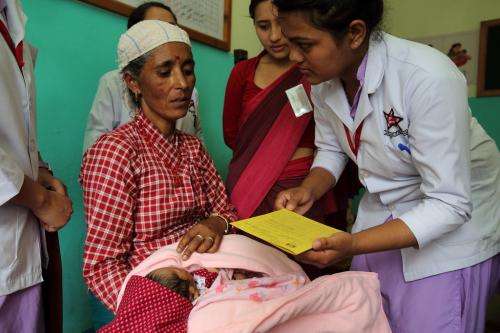Supplement strategy overhaul needed for new mums

Immediate intervention is needed to prevent detrimental outcomes from iron deficiency anaemia among postpartum mothers in Nepal, new research has found.
In response to the significant morbidity, mortality and socio-economic burden that anaemia has on mothers in Nepal Curtin University's School of Public Health PhD candidate and lead researcher Vishnu Khanal investigated factors associated with iron-folate consumption among women in Nepal who recently gave birth.
"While nutritional status of mothers during pregnancy has gained much attention recently, none of the literatures focussed on postpartum mothers," he says.
"I believe mothers deserve more attention than this…[with a] focus on improving their recovery from childbirth and dietary intake."
The researchers analysed data from the Nepal Demographic and Health Survey 2011; a cross-sectional study that captured household data across the entire country.
Maternal health information was obtained from mothers with children aged up to 59 months, and out of the 5,306 surveyed mothers, 4,148 had information on iron-folate supplementation during the postpartum period.
The World Health Organisation recommends new mothers take iron-folate supplementation for 45 days postpartum.
The participant's actual iron-folate intake was assessed through two questions: "After delivery were you given or did you buy any iron/folic acid (Iron-folate) tablets?"; and "After delivery, for how many days did you take the tablets?'"
They found that only 20.7 per cent of mothers consumed iron-folate supplements for 45 days into the postpartum period.
In addition, numerous socio-demographic and healthcare factors were found to substantially influence compliance and consumption rates.
"Compliance rate was almost four times lower for mothers with no education [12.3 per cent] compared to those who attained higher degree [48.5 per cent]," Mr Khanal says.
"There was vast difference between the mothers from lowest wealth quintile [12.1 per cent] compared to those from highest quintile [35.7 per cent]."
"The essential maternal health services such as antenatal visits and postnatal visits showed positive influence in increasing postpartum iron-folate compliance."
They found the mothers who attended four or more antenatal visits had far higher compliance rates [32.6 per cent] than those not attending [2.6 per cent], while those who attended at least one postnatal care visit had greater compliance [31.8 per cent] than those not attending [13.1 per cent].
"While changes in dietary practice is recommended for sustainable improvement, there is need to intervene immediately [as] our findings showed the current strategy is not working," he says.
Mr Khanal recommends increasing counselling; educating senior women in families; and strengthening the existing mechanism of outreach clinics and female community health volunteers to significantly increase compliance.
More information: Khanal V1, Adhikari M, Karkee R. "Low Compliance with Iron-Folate Supplementation Among Postpartum Mothers of Nepal: An Analysis of Nepal Demographic and Health Survey 2011." J Community Health. 2013 Dec 10. [Epub ahead of print]. www.ncbi.nlm.nih.gov/pubmed/24322600



















